Close to a dozen European countries have suspended the Coronavirus vaccine developed by AstraZeneca and the University of Oxford following reports of severe blood clots in some people who have received doses. Yesterday (Thursday, 11 March), Denmark, Norway and Iceland announced they will temporarily stop using the shot as a precaution.
While the European Medicines Agency has launched an investigation into the AstraZeneca vaccine, the Danish Health Authority said it would halt for at least two weeks the use of the AstraZeneca vaccine. Apparently, a 60-year-old woman in Denmark who received a shot died after developing a blood clot. The incident saw non-EU Norway and Iceland followed the Denmark’s lead in suspending AstraZeneca.
Italy, Bulgaria, Luxembourg, Estonia, Lithuania, Luxembourg and Latvia have also issued similar suspension. Austria, meanwhile, have stopped using batch “ABV5300” of the vaccine, suspected to be a defective batch. That batch of 1-million doses was delivered to 17 EU countries. The European Medicines Agency said a quality defect in that batch was “unlikely”, but is a possibility.
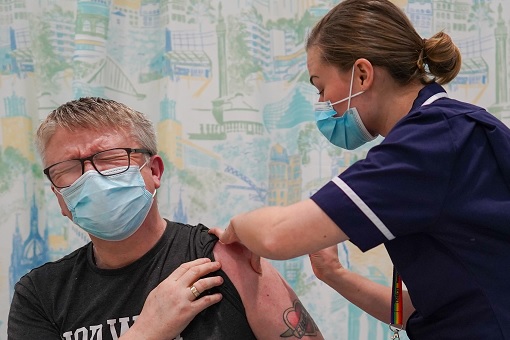
But Austria wasn’t taking any chances and has suspended the dubious batch after severe blood clots happened in several people who received those doses, where one 49-year-old woman died 10 days after the AstraZeneca-Oxford vaccination. Italy’s suspension was made after two people died after receiving shots, even though the doses were from a different batch.
About 5 million people in Europe had received the AstraZeneca vaccine and more than 70 countries have since authorized the vaccine – except the United States. The U.S. Food and Drug Administration (FDA) is still waiting for data from the clinical trial. The European regulator admits there were at least 30 reported cases of multiple “thrombosis” – the formation of blood clots within blood vessels.
Blood clotting, also known as coagulation, is the body’s first line of defense against bleeding. The clotting forms a “seal” to protect losses of too much blood. However, a blood clot that forms and stays in a blood vessel is called a thrombus or a thrombosis process. Thrombosis can cause serious complications if the clot moves to a crucial part of the circulatory system, such as the brain or the lungs.
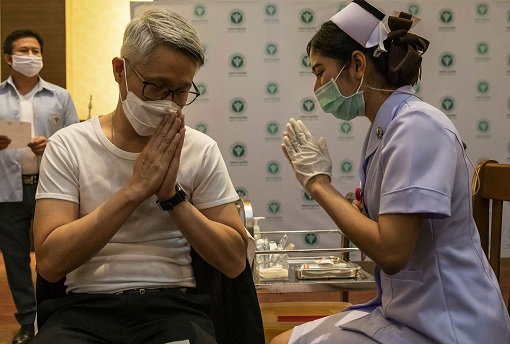
Today (Friday, 12 March), Thailand joined the bandwagon and became the first Asian country to stop the use of the vaccine, also over safety concern. As a result, Prime Minister Prayut Chan-o-cha and members of his Cabinet cancelled a scheduled plan on Friday to receive the vaccine shots, even though the batch of AstraZeneca vaccines is different from those distributed in Europe.
Thailand received its first batch of 117,300 doses of AstraZeneca vaccines on 24 February, together with 200,000 doses of China’s Coronavac vaccine. Interestingly, an estimated 40,000 people in Thailand have already received the Chinese vaccine since the country kicked off its vaccination programme on 28 February. The country says it will continue with its Coronavac rollout.
A country with 70 million populations, Thailand has recorded just over 26,500 Coronavirus infections and 85 fatalities. Therefore, it could afford to suspend the rollout of AstraZeneca for safety investigations. Piyasakol Sakolsatayadorn, an adviser for Thailand’s Covid-19 vaccine committee, said – “Though the quality of AstraZeneca is good, some countries have asked for a delay. So, we will delay too”.
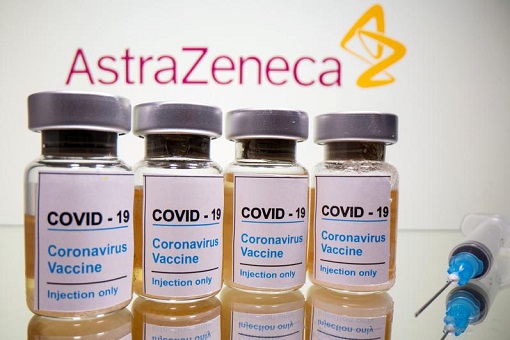
On the same day Thailand puts a brake on AstraZeneca-Oxford, Bulgaria also decided to suspend the use of the vaccine, and has even asked for a written statement from the European Medicines Agency (EMA) accounting for the jab’s safety. The safety scare is indeed a setback for AstraZeneca’s vaccine, which has already faced production lags that caused a slow rollout in Europe.
In addition, it has also struggled with a perception that it is less effective. While many Germans were complaining about a shortage of Coronavirus vaccines, they have also at the same time rejected the British-Swedish vaccine. The people in Germany prefer a vaccine developed by the German company BioNTech with Pfizer, largely because it showed higher efficacy in trials.
But not all countries were spooked by the blood clots fears. Portugal has said that the benefits of the jab continued to outweigh any risk it poses. Likewise, the Philippines health department said that there is “no reason” to halt the vaccination. South Korea is also going ahead with the jab. Australia, meanwhile, is busy explaining its decision to continue with the AstraZeneca vaccine.
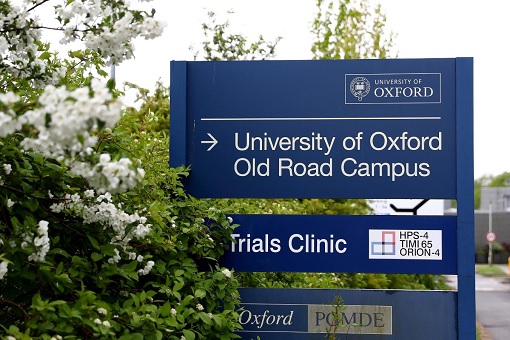
The United Kingdom, the first country to approve the AstraZeneca-Oxford Covid-19 vaccine for emergency use, has so far vaccinated more than 22 million people with a first dose of the vaccine. Unlike Pfizer and Moderna’s effectiveness of 95% and 94.5% respectively, the British pharmaceutical giant AstraZeneca’s vaccine has an average efficacy of 70%.
However, depending on dosage, the vaccine’s effectiveness could be as low as 62% and as high as 90%. Apparently, AstraZeneca said its vaccine, developed in collaboration with the University of Oxford, was assessed over two different dosing regimens. It has claimed that no hospitalizations or severe cases of the disease were reported in participants receiving the vaccine during the trials.
AstraZeneca and Oxford, however, are using a different methodology – a weakened virus that causes the common cold in chimpanzees. First, the chimp virus is modified so it cannot multiply and cause disease in the body. Then, it is uploaded with the gene for the Coronavirus spike protein, the club-shaped part that dots the surface of the virus and is used to penetrate human cells.

When the vaccine is injected, the chimp virus delivers the Coronavirus gene to human cells, which start to produce spike protein. These proteins, when detected by the human body immune system, will produce antibodies that are ready to attack the real Covid-19 virus. Oxford approach was considered safer as it has been used in vaccines for people with diseases like TB, MERS, Ebola and malaria.
However, AstraZeneca vaccine, which has been portrayed as “second-class” vaccine by the Germans, sparked potential safety issues last year while it was being tested in clinical trials. Two volunteers in Britain developed neurological symptoms consistent with transverse myelitis, an inflammatory syndrome that affects the spinal cord and is often caused by viral infections.
For now, the EMA said there is currently no evidence the AstraZeneca vaccination had caused blood clots, arguing that it is not listed as side effects of the vaccine. Dr. Phil Bryan, vaccines safety lead at Britain’s Medicines and Healthcare Products Regulatory, said – “Reports of blood clots received so far are not greater than the number that would have occurred naturally in the vaccinated population.”
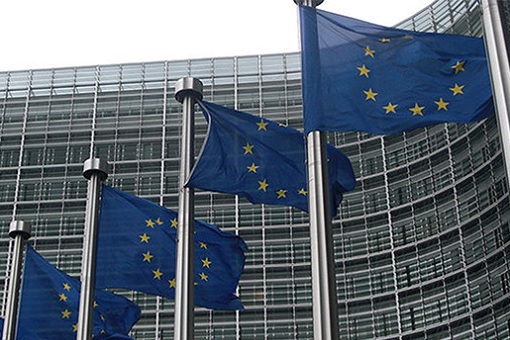
Other Articles That May Interest You …
- Sinopharm And Sinovac – Should You Trust Any Of These Chinese Covid-19 Vaccines?
- South Africa Suspends “Ineffective” Oxford-AstraZeneca Covid-19 Vaccine – Plans To Sell It And Use J&J Instead
- Before You Rush For Covid-19 Vaccine, Remember This – You Can’t Sue Anyone If Suffer Any Serious Side Effects
- The FDA Says Pfizer Vaccine Is Safe & Effective – But There’re Many Horror Stories, Including Allergy Warning
- Forget UK’s Covid-19 Variant – This South African Coronavirus Variant Is Deadlier And Can Spread Even Faster
- Mistake Or Cheating? – AstraZeneca-Oxford Admits Manufacturing Error In Its Vaccine Effectiveness Results
- Moderna Reveals Covid Vaccine – Here’s How This 94.5% Effective Vaccine Differs From Pfizer’s Vaccine
- Coronavirus – Here’s How China Is Back To Normal While The U.S. And Europe Are Getting From Bad To Worse
- Russia Reveals “Sputnik V” – But Scientists Condemn The Coronavirus Vaccine As Risky, Dangerous & Could Backfire
- 3 Coronavirus Variants Discovered – Surprisingly, “Type-A” Found In Americans, Wuhan’s Type-B And Type-C In Europe
- China Appears To Be Winning The Coronavirus War, And Other Countries Are Studying How The Chinese Did It

|
|
March 12th, 2021 by financetwitter
|


|

|

|

|

|

|
Comments
Well, folks, it jolly well looks entirely like none of the vaccines is safe, every vaccine has its valid criticism.
Other than relief from the symptoms of infection, no vaccine saves you from being infected, reinfected, and your merrily and joyously infecting others.
So I will again offer my humble but evidently sound strategy: remain panicky and kiasi – look at it this way, the vaccines doesn’t really do anything for you or others. However, if Ah Lah wants to put you ahead of the queue as a favoured and chosen wan to see Her, any vaccine can deliver the goods, send you on the way. If you don’t have any vaccination, you might live if a vaccine can call it a day for you.
As most Malaysians are well-schooled and blessed with the panic and kiasi mentality, the sound advice is to stay that way, every other day you get told a vaccine can kill, so the panic and kiasi strategy remains the only guaranteed outlook in life, while there’s life.
There’s of course, a fallback. If covid doesn’t kill you, whichever gomen we have would have its 1001 ways of getting you killed by virtue of its assured talent, Ameen.




























so far with side effects and death among all vaccines, pfizer-biontech seems best. same risk but with higher efficacy.